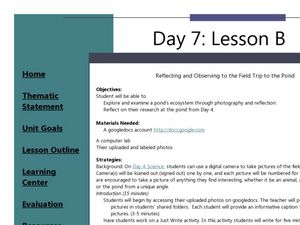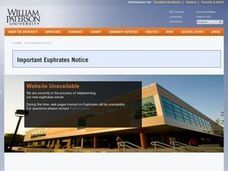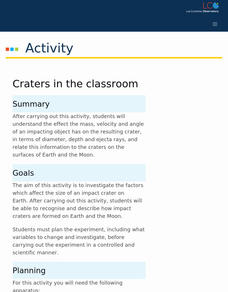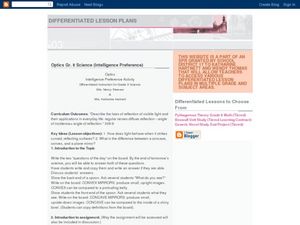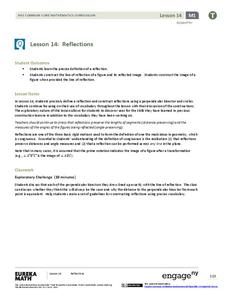Curated OER
Reflection
Eighth graders use a stencil to make a figure with which they discover the horizontal line of reflection, the vertical line of reflection, and the diagaonal line of reflection using coordinates.
Curated OER
Reflecting and Observing on the Field Trip to the Pond
Learners create an informative caption for photographs taken on a field trip to a pond. In this pond ecosystem lesson, students take photographs and create captions for them. Learners write a reflective essay on a picture they feel...
Curated OER
Laws of Reflection
Students experiment with mirrors to explore the Laws of Reflection. In this experimental instructional activity students develop their own experiments and follow a list of assigned steps then report what happens in their activity.
Mathematics Vision Project
Geometric Figures
Logical thinking is at the forefront of this jam-packed lesson, with young mathematicians not only investigating geometric concepts but also how they "know what they know". Through each activity and worksheet, learners wrestle with...
Curated OER
How Light Travels
Students conduct an experiment. In this light lesson, students work in groups to see how light travels in a straight line and how light reflects.
Curated OER
The Bending and Bouncing of Light
Students investigate refraction and reflection of light. In this light instructional activity, students perform 3 activities to observe light interacting with matter by using a flashlight. They explore refraction using a glass of water...
Curated OER
Do You Dread the Spread?
Students explore the increased reports of Severe Acute Respiratory Syndrome (SARS) in China. They hold a mock emergency health summit to address concerns and possible solutions on behalf of the affected countries and international health...
Curated OER
Creepy Reflection and Floating Finger
In this science exploration worksheet, students use a plastic mirror and a bowl full of water to get a fish's eye view of a water surface. Students follow the directions to conduct this investigation.
Curated OER
Exploring the Definition of Reflection
Students practice using a protractor and ruler to draw various points and lines. Using a computer, they draw the points and lines in the program and describe the differences between their drawing and the computer's drawing. They complete...
Curated OER
Six Exercise Sets on Transformations
Middle and high schoolers solve fifteen problems from six exercise sets covering transformations, reflections, rotations, and enlargements. The solutions are provided.
Exploratorium
Polarized Sunglasses
Reflected waves of light move within a plane, and because of this, polarizing materials can reduce the glare our eyes see. This resource explains how to set up a demonstration of this effect. Consider it for use in your physical science...
Jefferson Lab
Optics: Mirrors and Lenses
Did you see that or did I imagine it? Optical illusions are often created with mirrors and lenses, and here is a presentation that covers many different types of mirrors and lenses and how they work. Flat, concave, and convex mirrors, as...
Las Cumbres Observatory
Craters in the Classroom
Laws of motion apply both in space and on Earth. Young experimenters model object impact on the Earth and moon. They use data to determine the effect mass and velocity have on the resulting craters and how that relates to the energy of...
Curated OER
Indirect Measurement with Similar Triangles
Students use similar triangles to find missing heights. In this using similar triangles to find missing heights lesson plan, students use proportions to find the heights of missing side lengths. Students find the height of trees and...
Curated OER
Light
Students examine how light waves travel. In this properties of light instructional activity, students observe how light travels in water, how light is reflected and refracted, and how light is pure energy.
Curated OER
Intelligence Preference
Eighth graders describe how light behaves when it strikes a surface. In this physics lesson, 8th graders investigate how the different types of mirrors reflect light. They work with their chosen group on a task they selected.
Curated OER
The Shadow Knows
Sixth graders examine the relationship between light and the angle it strikes objects. In groups, they shine light from a flashlight on different objects and describe how it affects the shadow. To end the lesson, they complete a...
Curated OER
Take-Home Midterm Exam #3
The University of Hawaii has published a vast collection of midterm and final exams for their Physics 152 course. This particular exam offers a variety of assessment methods, and covers the topic of electromagnetic radiation....
Physics Classroom
Law Enforcement - Refraction
Pupils apply their knowledge of refraction to four different sets of challenges. Each of the first three focus on one variable's impact on the direction of bending. The fourth combines variables for greater challenge.
Curated OER
Why Does ASA Work?
Your geometry learners explore Angle-Side-Angle congruence in this collaborative task. The sum of the interior angles of all triangles being one hundred eighty degrees, is the key learners will discover as they explain their reasoning...
Curated OER
Why Does SAS Work?
Your geometry learners are guided by questions that help them use the language of reflections to explain the Side-Angle-Side congruence between two triangles in this collaborative task. Given a sample solution, declaring the triangles...
EngageNY
Reflections
Facilitate creativity in your math class as individuals learn the definition of a geometric reflection and correctly construct a model, as well as its reflected image. They use a perpendicular bisector and circles to elaborate on...
EngageNY
Characterize Points on a Perpendicular Bisector
Learn transformations through constructions! Pupils use perpendicular bisectors to understand the movement of a reflection and rotation. They discover that the perpendicular bisector(s) determine the line of reflection and the center of...
Curated OER
Lesson Plan Outline for Rainbow Science
Young scientists study light reflection and refraction as they determine the critical angle, the rainbow angle, and color separation in rainbows. Teams record the data they collect in a shared spreadsheet and discuss results with the class.



